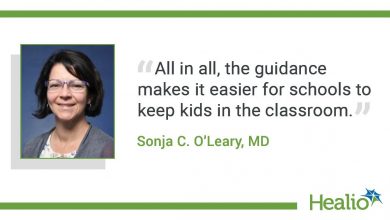Infectious Disease
Up to 1 in 4 adult survivors experience at least one long COVID symptom

Source/Disclosures
Published by:
Disclosures:
The authors report no relevant financial disclosures.
ADD TOPIC TO EMAIL ALERTS
Receive an email when new articles are posted on
Please provide your email address to receive an email when new articles are posted on . ” data-action=”subscribe”> Subscribe
We were unable to process your request. Please try again later. If you continue to have this issue please contact [email protected].
Back to Healio
COVID-19 survivors face a significantly higher risk than control patients for developing conditions affecting major system of the body, according to a study of nearly 2 million patients.
For example, up to one-quarter of people who have had COVID-19 experience at least one symptom of long COVID, the most common of which are acute pulmonary embolism and respiratory symptoms, researchers reported Tuesday in MMWR.

Bull-Otterson L, et al. MMWR Morb Mortal Wkly Rep. 2022;doi:10.15585/mmwr.mm7121e1.
“A growing number of persons previously infected with SARS-CoV-2, the virus that causes COVID-19, have reported persistent symptoms, or the onset of long-term symptoms, 4 weeks or more after acute COVID-19,” CDC epidemiologist Laura Bull-Otterson, PhD, and colleagues on the agency’s COVID-19 Emergency Response Team wrote.
“As more persons are exposed to and infected by SARS-CoV-2, reports of patients who experience persistent symptoms or organ dysfunction after acute COVID-19 and develop post-COVID conditions have increased,” they added.
For their study, Bull-Otterson and colleagues analyzed electronic health record data from March 2020 through November 2021 of US adults to assess the incidence of 26 conditions often attributable to post-COVID, including acute myocardial infarction, asthma, renal failure, mood and sleeping disorders, and type 1 and type 2 diabetes.
According to the study, the researchers compared the incidence of these conditions among more than 353,000 patients who had COVID-19 and more than 1.6 million matched patients who did not. They followed study participants for up to 365 days after the index encounter until one or more condition was observed or through Oct. 31, 2021, if no conditions were observed.
The study showed that among all participants, 38% of COVID-19 survivors experienced an incident condition compared with 16% of control patients. The conditions included cardiovascular, pulmonary, hematologic, renal, endocrine, gastrointestinal, musculoskeletal, neurologic and psychiatric signs and symptoms.
Bull-Otterson and colleagues reported that the highest RRs were for acute pulmonary embolism (RR = 2.1 for patients aged 16 to 64 and 2.2 for patients aged 65 years or older) and respiratory signs and symptoms (RR = 2.1 in both age groups).
Additionally, 35.4% of survivors experienced an incident condition compared with 14.6% of control patients in the younger age group. These rates were 45.4% and 18.5% among patients aged 65 and older.
Overall, the study results translate to one in five COVID-19 survivors aged 18 to 64 years and one in four survivors aged 65 and older experiencing an incident condition that might be attributable to previous COVID-19 infection, Bull-Otterson and colleagues said.
“As the cumulative number of persons ever having been infected with SARS-CoV-2 increases, the number of survivors suffering post-COVID conditions is also likely to increase,” they wrote. “Therefore, implementation of COVID-19 prevention strategies, as well as routine assessment for post-COVID conditions among persons who survive COVID-19, is critical to reducing the incidence and impact of post-COVID conditions, particularly among adults aged 65 years and older.”
ADD TOPIC TO EMAIL ALERTS
Receive an email when new articles are posted on
Please provide your email address to receive an email when new articles are posted on . ” data-action=”subscribe”> Subscribe
We were unable to process your request. Please try again later. If you continue to have this issue please contact [email protected].
Back to Healio





